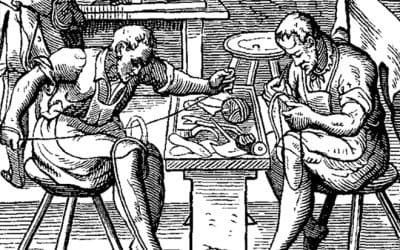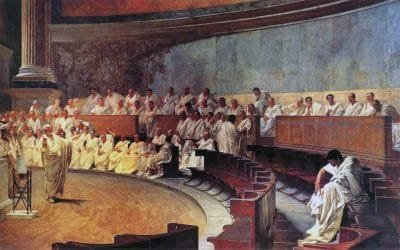Political, social, and economic life in the Middle Ages revolved around two sets of institutions.
Economics
An Introduction to Austrian Economics (Part 9 of 9): Booms and Busts
An Introduction to Austrian Economics (Part 8 of 9): Government Intervention
The Ancient Romans: From Rule of Law to Price Controls
The area in which the Ancient Romans did leave a body of thought, and one that has had lasting influence and significance for future generations, especially in the West up until our own time was in the area of law and contract.
Video: An Introduction to Austrian Economics (Part 7 of 9): Everything Takes Time: Savings, Investment, and Prosperity
Video: An Introduction to Austrian Economics (Part 6 of 9): Why Socialism Was and Always Will Be “Impossible”
Aristotle and Economics
Political-Economic Ideas of The Greeks, Part 3
Video: An Introduction to Austrian Economics (Part 5 of 9): Economic Calculation, Profit and Loss
Austrian Economics is the most powerful explanation of why governments, no matter how well-intentioned, lack the knowledge, wisdom and ability to direct the lives of multitudes of people better than those people can do for themselves.
Video: An Introduction to Austrian Economics (Part 4 of 9): Entrepreneurs
Austrian Economics is the most powerful explanation of why governments, no matter how well-intentioned, lack the knowledge, wisdom and ability to direct the lives of multitudes of people better than those people can do for themselves.
Video: An Introduction to Austrian Economics (Part 3 of 9): The Market as a Process of Competitive Cooperation
Austrian Economics is the most powerful explanation of why governments, no matter how well-intentioned, lack the knowledge, wisdom and ability to direct the lives of multitudes of people better than those people can do for themselves.
Video: An Introduction to Austrian Economics (Part 2 of 9): Economics is Human Action
Austrian Economics is the most powerful explanation of why governments, no matter how well-intentioned, lack the knowledge, wisdom and ability to direct the lives of multitudes of people better than those people can do for themselves.
Ludwig von Mises’s Majestic Magnum Opus, Human Action: A Treatise on Economics
Ludwig von Mises’s majestic magnum opus, Human Action: A Treatise on Economics, was published on September 14, 1949. In the nearly seven decades since its appearance, Human Action has come to be recognized as one of the truly great classics of modern economics.
Book Excerpt: Austrian Economics & Public Policy: Restoring Freedom and Prosperity by Richard Ebeling
Austrian Economics is the most powerful explanation of why governments, no matter how well-intentioned, lack the knowledge, wisdom and ability to direct the lives of multitudes of people better than those people can do for themselves if left sufficiently at liberty to do so.
Video: An Introduction to Austrian Economics (Part 1 of 9): Menger, Mises and Hayek
Austrian Economics is the most powerful explanation of why governments, no matter how well-intentioned, lack the knowledge, wisdom and ability to direct the lives of multitudes of people better than those people can do for themselves.
The Myth of the Myth of Barter
There is, after all, at least one impulse among humans that’s more deep-seated than their “propensity to truck, barter, and exchange.” I mean, of course, their propensity to let themselves be thoroughly bamboozled.
A Monetary Policy Primer, Part 5: The Supply of Money
On the Fed’s “instruments of monetary control,” which include devices for regulating the total quantity of bank reserves and circulating Federal Reserve notes, and also for regulating the quantity of bank deposits and other forms of privately-created money that will be supported by any given quantity of bank reserves.
A Monetary Policy Primer, Part 4: Stable Prices or Stable Spending?
A better alternative, if only it can somehow be achieved, or at least approximated, is a monetary system that adjusts the stock of money in response to changes in the demand for money balances, thereby reducing the need for changes in the general level of prices.
A Monetary Policy Primer, Part 3: The Price Level
What sort of monetary policy or regime best avoids the costs of having too much or too little money?
A Monetary Policy Primer, Part 2: The Demand for Money
How can a central bank manage a quantity without being certain just how to define, let alone measure, that quantity? How is it possible for the quantity of money supplied to differ from the quantity demanded? When those things do differ, how can one tell? Finally, just what does “the demand for money” mean?
A Monetary Policy Primer, Part 1: Money
What, exactly, is “monetary policy” about? Why is there such a thing at all? What should we want to accomplish by it — and what should we not try to accomplish?
Karl Marx’s Communist Theory of the “Injustice” of Capitalism
Nothing that Lenin or Stalin implemented in Soviet Russia or Mao in China, for example, was not called for or implied in Marx’s own writings and arguments.
Ayn Rand, Ludwig Von Mises and the Austrians: How I Became an Economist for Capitalism
When I was about seventeen, and living in Hollywood, I met two men who introduced me to the works of Ayn Rand.
Trade Deficit Angst
International trade operates under the same general principles as domestic trade.
Look Beyond Supply and Demand to Understand Labor
The marginal utility of human work does not diminish, as the number of workers increases. As the size of a market grows, the value of firms and workers within it rises.
Subscribe for free.
Read by students, professors, and citizens, Capitalism Magazine provides over 9,000 free to read articles and essays from pro-reason, individual rights perspective.
No spam. Unsubscribe anytime.










